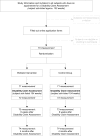Empowerment of disability benefit claimants through an interactive website: design of a randomized controlled trial
- PMID: 19426557
- PMCID: PMC2689177
- DOI: 10.1186/1472-6947-9-23
Empowerment of disability benefit claimants through an interactive website: design of a randomized controlled trial
Abstract
Background: Individuals claiming a disability benefit after long-term sickness absence, have to undergo medical disability assessments. These assessments, often carried out by specialized physicians, can be complicated by wrong expectations or defensive attitudes of disability benefit claimants. It is hypothesized that empowerment of these claimants will enhance the physician-patient relationship by shifting claimants from a passive role to a more active and constructive role during disability assessments. Furthermore, empowerment of claimants may lead to a more realistic expectation and acceptance of the assessment outcome among claimants and may lead to a more accurate assessment by the physician.
Methods/design: In a two-armed randomized controlled trial (RCT), 230 claimants will be randomized to either the intervention or control group. For the intervention group, an interactive website was designed http://www.wiagesprek.nl using an Intervention Mapping procedure. This website was tested during a pilot study among 51 claimants. The final version of the website consists of five interactive modules, in which claimants will be prepared and empowered step-by-step, prior to their upcoming disability assessment. Other website components are a forum, a personal health record, a personal diary, and information on disability assessment procedures, return to work, and coping with disease and work disability. Subjects from the control group will be directed to a website with commonly available information only. Approximately two weeks prior to their disability assessment, disability claimants will be recruited through the Dutch Workers Insurance Authority (UWV). Outcomes will be assessed at five occasions: directly after recruitment (baseline), prior to disability assessment, directly after disability assessment as well as 6 and 16 weeks after the assessment. The study's primary outcome is empowerment, measured with the Vrijbaan questionnaire. Secondary outcomes include claimants' satisfaction, perceived justice, coping strategy, and knowledge. A process evaluation will also be conducted.
Discussion: This study evaluates the effectiveness of an interactive website aimed at empowerment of disability claimants. It is hypothesized that by increasing empowerment, the physician-patient relationship may be enhanced and claimants' satisfaction and perceived justice can be improved. Results are expected in 2010.
Trial registration: NTR-1414.
Similar articles
-
Effectiveness of an interactive website aimed at empowerment of disability benefit claimants: results of a pragmatic randomized controlled trial.J Occup Rehabil. 2011 Sep;21(3):410-20. doi: 10.1007/s10926-010-9283-z. J Occup Rehabil. 2011. PMID: 21258848 Free PMC article. Clinical Trial.
-
Process evaluation of a web-based intervention aimed at empowerment of disability benefit claimants.BMC Med Inform Decis Mak. 2011 Feb 16;11:10. doi: 10.1186/1472-6947-11-10. BMC Med Inform Decis Mak. 2011. PMID: 21324172 Free PMC article. Clinical Trial.
-
Effectiveness of a web-based intervention for injured claimants: a randomized controlled trial.Trials. 2013 Jul 20;14:227. doi: 10.1186/1745-6215-14-227. Trials. 2013. PMID: 23870540 Free PMC article. Clinical Trial.
-
Prevention of disability: the opinion of claimants applying for a disability benefit.Work. 2014;49(2):335-41. doi: 10.3233/WOR-131663. Work. 2014. PMID: 23803444
-
A limb to stand on? A scoping review of employability assessment in Australian total and permanent disability insurance claims.Disabil Rehabil. 2020 Jun;42(13):1923-1933. doi: 10.1080/09638288.2018.1542462. Epub 2019 Jan 24. Disabil Rehabil. 2020. PMID: 30676105
Cited by
-
Effectiveness of an interactive website aimed at empowerment of disability benefit claimants: results of a pragmatic randomized controlled trial.J Occup Rehabil. 2011 Sep;21(3):410-20. doi: 10.1007/s10926-010-9283-z. J Occup Rehabil. 2011. PMID: 21258848 Free PMC article. Clinical Trial.
-
eHealth program to empower patients in returning to normal activities and work after gynecological surgery: intervention mapping as a useful method for development.J Med Internet Res. 2012 Oct 19;14(5):e124. doi: 10.2196/jmir.1915. J Med Internet Res. 2012. PMID: 23086834 Free PMC article.
-
Active Involvement of End Users When Developing Web-Based Mental Health Interventions.Front Psychiatry. 2017 May 3;8:72. doi: 10.3389/fpsyt.2017.00072. eCollection 2017. Front Psychiatry. 2017. PMID: 28515699 Free PMC article.
-
Process evaluation of a web-based intervention aimed at empowerment of disability benefit claimants.BMC Med Inform Decis Mak. 2011 Feb 16;11:10. doi: 10.1186/1472-6947-11-10. BMC Med Inform Decis Mak. 2011. PMID: 21324172 Free PMC article. Clinical Trial.
-
Active patient participation in the development of an online intervention.JMIR Res Protoc. 2014 Nov 6;3(4):e59. doi: 10.2196/resprot.3695. JMIR Res Protoc. 2014. PMID: 25379679 Free PMC article.
References
-
- Razavi D, Delvaux N, Marchal S, De CM, Farvacques C, Slachmuylder JL. Testing health care professionals' communication skills: the usefulness of highly emotional standardized role-playing sessions with simulators. Psychooncology. 2000;9:293–302. doi: 10.1002/1099-1611(200007/08)9:4<293::AID-PON461>3.0.CO;2-J. - DOI - PubMed
-
- Fellowes D, Wilkinson S, Moore P. Communication skills training for health care professionals working with cancer patients, their families and/or carers. Cochrane Database Syst Rev. 2004;2:CD003751. - PubMed
Publication types
MeSH terms
LinkOut - more resources
Full Text Sources
Medical


